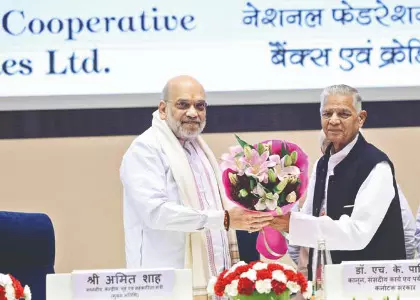Shah launches Co-Op Kumbh 2025, unveils digital apps for UCBs

NEW DELHI: Union Home Minister and Minister of Cooperation, Amit Shah said that the Cooperative Kumbh of urban cooperative banks and credit societies represents an important milestone in India’s cooperative movement, organized to commemorate the International Year of Cooperatives. Inaugurating the Co-Op Kumbh 2025, Shah said the event will also be a platform for policy dialogue, technology exchange, and innovation aimed at unlocking new opportunities in the urban cooperative banking and credit society sectors.
He said the Delhi Declaration 2025, to be released during the international conference organized by NAFCUB, will act as a roadmap for the growth and modernization of urban cooperative banks. Shah mentioned that in the last three to four years, the country’s cooperative banking sector has seen fresh enthusiasm and reform-driven momentum.
While launching Sahkar Digi-Pay and Sahkar Digi-Loan to promote digital inclusion in the cooperative sector, Shah said that even the smallest urban cooperative bank (UCB)will now be able to offer digital payment facilities to their customers through the Sahkar Digi-Pay app.
Emphasizing the reform initiatives of the government, he said that since the formation of the Ministry of Cooperation, several landmark policy decisions were taken by the Modi government to bring structural changes across the cooperative ecosystem in areas such as modernization efforts, policy reforms, and model bylaws regarding Primary Agricultural Credit Societies (PACS), which have now been adopted by all state governments.
Amit Shah listed the four important goals of the Ministry, starting with Generation Sahakar: to link the young generation with the cooperative movement through a newly established Tribhuvan Sahkari University, which will take care of all educational and research needs of the cooperative sector. He announced that the government proposes to establish one urban cooperative bank in every city having a population of over two lakh in the next five years. Urban cooperative banks, he said, have to play a multi-sectoral role in empowering the young entrepreneurs, self-help groups, and the weaker sections of society.
He articulated that the sector has achieved a remarkable improvement in financial discipline, noting that NPAs have decreased from 2.8 percent to just 0.06 percent over the last two years.
Referring to the global recognition of Indian cooperatives, Shah said the International Cooperative Alliance has ranked Amul first and IFFCO second among the world’s leading cooperatives. He highlighted that Amul, through its 3.6 million farmer members—65 percent of whom are women—has achieved a turnover exceeding Rs 90,000 crore, while IFFCO, with a turnover of Rs 41,000 crore and a profit of Rs 3,000 crore, now exports its innovative nano urea and DAP to 65 countries. He added that these achievements actually have shown that the cooperative model in India remains a strong driver of inclusive growth, remarkably contributing to the country’s vision for sustainable development and equitable prosperity.



